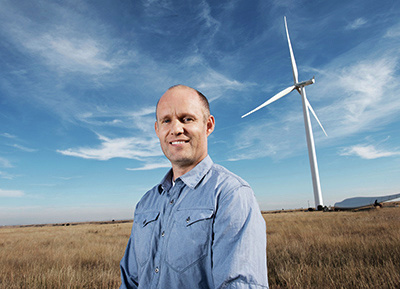News Release from Siemens Gamesa Renewable Energy
Wind Industry Profile of
What's New in the Windfair World - Better Cooling Systems for Wind Turbines
Uffe Eriksen, a researcher at Siemens won the Inventor of the Year 2014 Award for his contribution to the development of a superior wind turbine cooling system. By offering longer service life, lower costs, and fewer environmental risks, Eriksen hopes that his inventions will make wind turbines a genuine alternative to fossil energy sources. The Dane has developed solutions to make the cooling of generators and main bearings more efficient and ecologically compatible. In the process, the new technologies simplify the design of the systems and improve the performance. Let us hear what Eriksen has to tell us on the improvements to wind turbine design...
“An initial step towards a better main bearing performance is to be able to control the temperature for a grease lubricated main bearing,” explains Eriksen, who has been conducting research into wind power at Siemens for ten years.
The main bearing of a wind turbine is subjected to high loads. Until now, it has only been possible to control the bearing performance by cooling for an oil lubricated bearings but now it’s also possible for grease lubricated bearings. “My job is to scrutinize the status quo to simplify our products,” says Eriksen. “We can offer a simpler product at a lower price and thus make it more attractive to our customers,” the engineer continues.
And that’s why Eriksen and his team in Brande, Denmark spent a year and a half working on the development of an air cooling system for high-performance wind turbines.
In the new generator cooling system, the ambient air is passed through the nacelle into the generator. “High humidity levels or salt can lead to corrosion and cause damage to the machine,” explains Eriksen. This is why the air is filtered and dehumidified first before it is blown by a fan to the temperature-sensitive generator parts. The cooling air flows back out again through an outlet channel without necessitating any additional openings to the outside in the generator housing.

Compared to a conventional air-water-air heat exchanger, there’s a better heat transmission in direct air cooling, and the design itself is much simpler. “The great advantage of ambient air cooling, however, is that the generator produces more power thanks to the improved cooling,” stresses Eriksen. With a heat exchanger there is always heat loss, he explains. This means that the lowest temperature achievable in the generator will always be higher than the ambient temperature. This is why air cooling is superior to conventional cooling systems. Thanks to the lower temperature, the generator can operate under a higher load and thus produce more energy.
If you would like to receive more information on this article, our Newsletter or find out more about what w3.windfair.net has to offer, please, do not hesitate to contact Trevor Sievert at ts@windfair.net.
Please don't forget to follow us on Twitter: w3.windfair.net on Twitter
w3.windfair.net is the largest international B2B internet platform in wind energy – ultimately designed for connecting wind energy enthusiasts and companies across the globe.
- Source:
- Siemens Wind Power
- Author:
- Edited by Trevor Sievert, Online Editorial Journalist / by Uffe Eriksen
- Email:
- support.energy@siemens.com
- Link:
- www.siemens.com/...

